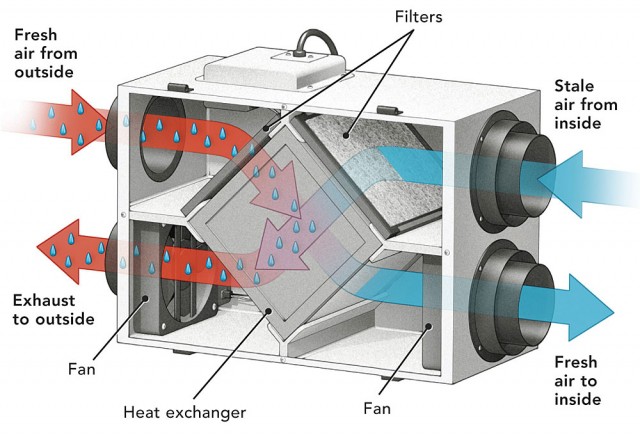The Function of HRV in Sustainable Living
Wiki Article
Exploring the Perks of Heat Recovery Ventilation for Power Efficiency in Residences
Heat Recovery Ventilation (HRV) systems supply homeowners a useful method to enhancing power effectiveness. By redeeming warm from outbound air, these systems can substantially minimize cooling and heating expenses. Additionally, they provide a stable supply of fresh air, boosting indoor air quality and convenience degrees. As home owners think about lasting alternatives, recognizing the subtleties of HRV systems ends up being progressively important. What factors should one review before making such a financial investment?Understanding Heat Recovery Ventilation Solutions

How HRV Enhances Indoor Air Top Quality

Energy Financial Savings: The Monetary Advantages of HRV
Optimizing power efficiency, heat recovery ventilation (HRV) systems use considerable monetary advantages for home owners. By recuperating and reusing warm from exhaust air, HRVs substantially lower heating & cooling prices. This modern technology can lead to energy cost savings of as much as 30%, relying on environment and usage patterns. Home owners often notice minimized utility costs soon after installation, making HRVs a financially smart investment over time. Additionally, numerous areas supply rewards or discounts for energy-efficient upgrades, additionally boosting the monetary appeal. As energy costs proceed to increase, the cost-effectiveness of HRVs becomes significantly clear. Generally, the unification of HRV systems not only promotes power efficiency but likewise adds to long-lasting economic cost savings for homes.Go Here
The Environmental Influence of Heat Recovery Ventilation
A considerable environmental benefit of heat recovery ventilation (HRV) systems exists in their capacity to reduce overall energy intake. By reclaiming heat from exhaust air and transferring it to inbound fresh air, HRV systems decrease the requirement for energy-intensive home heating and cooling methods. This decrease in energy need adds to decrease greenhouse gas discharges, as much less nonrenewable fuel source is needed to keep comfy indoor temperatures. Furthermore, HRV systems boost interior air top quality by successfully trading stagnant air with fresh outside air, reducing dependence on mechanical air conditioning systems that can damage the atmosphere. On the whole, the execution of HRV systems sustains sustainable living techniques and lines up with global efforts to combat environment modification by advertising energy performance in domestic settings.
Choosing the Right HRV System for Your Home
Exactly how can home owners assure they select the appropriate heat recovery ventilation (HRV) system for their requirements? First, they ought to evaluate their home's size and layout, as these variables influence air flow demands. Next, assessing the system's performance scores is important, as higher scores show far better efficiency and energy cost savings. House owners ought to also think about installation and maintenance costs, contrasting various brand names and models for value. Additionally, it is necessary to assess sound degrees, as some systems run more silently than others. Consulting with a/c professionals can supply customized recommendations based on specific home conditions. Examining individual evaluations and warranties can assist in making an informed decision, ensuring that the chosen HRV system successfully boosts indoor air high quality and power performance.Frequently Asked Questions

Just how Frequently Should I Tidy or Keep My HRV System?
The frequency of cleansing or maintaining a heat recuperation ventilation (HRV) system typically relies on usage and environmental aspects. Usually, it is suggested to do upkeep every six read this post here months to ensure peak efficiency and air top quality.
Can HRV Systems Help In Reducing Humidity Degrees Indoors?
HRV systems can efficiently minimize interior moisture degrees by exchanging stagnant, humid air with fresh, drier air from outside. HRV Heat Recovery Ventilation. This procedure assists keep a balanced interior setting, improving comfort and preventing moisture-related problems
What Is the Life expectancy of a Typical HRV System?
The lifespan of a common heat recovery ventilation (HRV) system differs, typically lasting in between 10 to 15 years. Regular maintenance can extend its effectiveness and operational life, making sure peak efficiency throughout its use duration.Are There Any Kind Of Noise Problems With HRV Solutions?
Sound interest in HRV systems can arise, specifically from fan procedure. Nonetheless, lots of modern-day units are designed to minimize sound degrees, guaranteeing they run click site silently while preserving performance, which addresses prospective disruptions in living environments.Can I Install an HRV System Myself, or Do I Need a Specialist?
The private contemplated whether to mount the heat recovery ventilation (HRV) system personally or hire an expert. Normally, while do it yourself installation is possible, expertise warranties appropriate functionality and compliance with neighborhood building ordinance, boosting system effectiveness.Report this wiki page